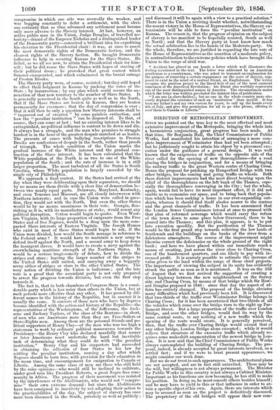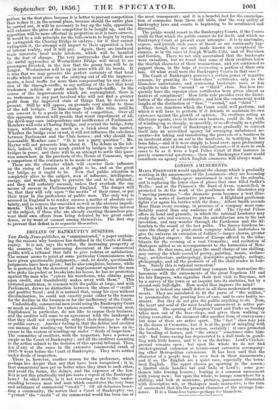DIRECTION OP METROPOLITAN IMPROVEMENT.
SINCE we pointed out the true key to the most effectual and most extensive improvement of the Metropolis, bringing the whole into a harmonious conjunction, great progress has been made. At that time, Sir Be]: jamin Hall, the Chief Commissioner of Public Works, had manifested his intention of arranging a more com- plete improvement of Westminster than had yet been attempted; but he judiciously sought to attain his object by a piecemeal exe- cution under the guidance of a general design. It was well known that the exigencies of traffic on the opposite side of the river called for the opening of new thoroughfares—for a road placing the bridges in conjunction, and for a means of bringing the railway traffic to the great Western centre of Charing Cross. Hence the proposal for patching up Hungerford Bridge with two other brides, for the coining and going traffic on wheels. Both these district improvements had the most direct bearing upon the relief of the thoroughfares on the left bank of the Thames, espe- cially the thoroughfares converging in the City ; but the whole, again, would fail to have its most important effect, if it did not enable us to economize our space, and to bring back that popula- tion which has been seeking a home in our ever-expanding out- skirts, whereas it should find itself abodes nearer to the centres and the great channels of traffic. It has been announced that the London Sewer Commissioners intend at once to proceed with that plan of reformed sewerage which would carry the refuse of the town down to some place below Gravesend, there to be poured into the Thames; and this plan, it appears, is to be put into execution speedily. But the purification of the Thames would be the first grand step towards relieving the low lands of Southwark and the buildings on the banks of the river from a deleterious atmosphere. The course of the improvement might likewise correct the deficiencies on the whole ground of the right bank ; and here we have placed within our immediate reach a means of creating, just across the river close to Charing Cross, one of the handsomest quarters, and one likely to pay with in- creased profit. It is scarcely possible to estimate the increase of value given to the land within the range of these chief projects. The importance of viewing the subject in its unity has evidently struck the public as soon as it is mentioned. It was on the 23d of August that we first revived the suggestion of creating a direct highway between the new neighbourhood on the Surrey side and Charing Cross, by means of that bridge which Sir How- ard Douglas .proposed in 1846: since that day the aspect of af- fairs has entirely changed. The proposal of the bridge obviates many difficulties which had previously been felt. It is discovered that two-thirds of the traffic over Westminster Bridge belongs to Charing Cross • for it has been ascertained that two-thirds of all the vehicles which come over the bridge tarn to the right up Par- liament Street. But a large proportion of the traffic over London Bridge, and over the other bridges, would find its way by the same central route, to say nothing of a new traffic which the opening of the route would create. It is generally perceived, then, that the traffic over Charing Bridge would exceed that of any other bridge, London Bridge alone excepted ; while it would relieve that structure of the excessive traffic which already re- quires some makeshift augmentation of the newest bridge in Lon- don. It is now said that the Chief Commissioner of Public Works always contemplated the building of Charing Bridge. The pro- posal, indeed, is already accepted by great interests involved, as a settled fact ; and if we were to trust present appearances, we might consider our work done.
But we do not trust to such appearances. The architectural plans are not accepted, and are in fact still uninvited. There may be the will, but willingness is not always permanent. The Minister for Public Works in this country is not always a Cabinet Minister. Important as his functions are now becoming, he has still to make his position. In doing so, he must consult others besides himself; and he may have to yield to this or that influence in order to at- tain a specific object of his own. Again, there are interests which may be aroused as soon as the project is definitively discussed. The proprietary of the old bridges will oppose their new com-
petitor, in the first place because it is better to prevent competition than to face it; in the second place, because should the entire plan be carried out, it will be necessary to buy up the tolls, opposition will enhance the price of the competitor to be bought up, and the opposition will be more effectual in proportion as it is more earnest. It would be a safe principle for the toll-owners to begin by trying to extinguish the Charing Bridge in embryo ; for if they cannot extinguish it, the attempt will impart to their opposition a look of intense reality, and it will pay. Again, there are landward trade interests, local trade interests, which will be haunted by the fear of change. The very pastrycooks that dwell near the awful approaches of Westminster Bridge will dread to see passengers diverted, in the fear that the penny bun will be in danger. Westminster will be up in arms with all its bonds. It is true that we may perceive the perfect certainty of that local traffic which must arise on the carrying out of all the improve- ments, a local traffic far more than compensating for any diver- sion of the through-traffic, to say nothing of the fact that local tradesmen seldom do profit much by through-traffic. In the course of the improvements which are contemplated, there is no tradesman in any part involved who will not find a greater profit from the improved state of things than he derives at present. Still he will oppose, on grounds very similar to those of the toll bridges. To him change looks like ruin, until he can convert it to a profit in the trade of competition. Over all this opposing interest will preside that worst impediment of all, the devil-may-care independence and indifference of Parliament. Members will vote a Charing Bridge, and rescind the bridge, forty times, without caring so much as a brick about the matter. Whether the bridge exist or not, it will not influence the cab-fares between Parliament and the Club houses ; and why should the honourable Member care ? " It is not a party question " ; Mr. Hayter will not persecute him about it. The debate in the lob- bies, indeed, will be very much guided by bridges in embryo or bridges in posse, and there will be an attempt to settle this ques- tion somewhere in the precincts of the House of Commons, upon a comparison of the contracts to be made or unmade. These are the obstacles which will exercise their influence on the rising of London as it ought to be, and on the great key bridge as it ought to be. Now that public attention is completely alive to the subject, men of influence, intelligence, energy, and wealth, begin to perceive the end to be attained,; and they will certainly succeed, unless they overlook the one means of success in Parliamentary England. The danger will be, that they will rely upon "the merits" of their cause, or put their trust in the professions of public men. The only way to succeed in England is to render success a matter of absolute cer- tainty, and to remove the concealed as well as the obvious impedi- ments. This will be easy for those who perceive the true interest of the subject, if those who are already exerting themselves pre- vent their own efforts from being defeated by too great confi- dence, or by want of concert among themselves. The first step to prevent that defeat is to organize themselves.



























 Previous page
Previous page